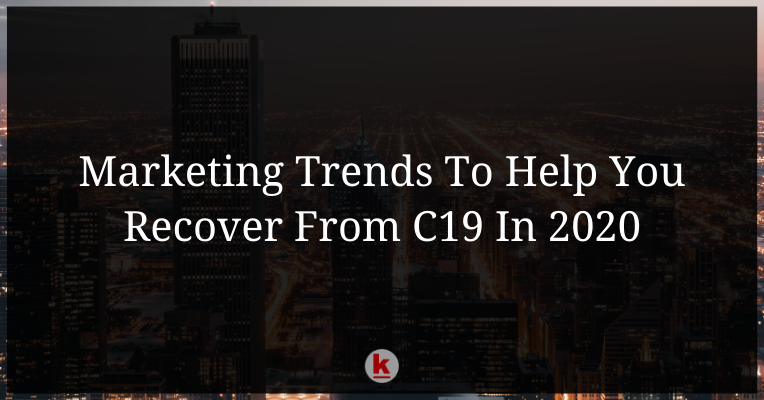
Marketing Trends To Help You Recover From C19 In 2020

Was your business among those that were adversely affected by the COVID-19 pandemic? Are you trying to figure out how to rapidly recover from your pandemic-related losses in 2020? Marketing is the key to rebounding from the adverse effects of the lockdown.
The pandemic lockdown had a tremendous impact on the global economy. The ultimate result of the freeze on the economy was a multi-faceted attack on the health of the economic environment. The economic aftermath of the pandemic in the United States is showing to be a fate second only to the Great Depression.
The unemployment rate reported in April was 14.7%. At its peak, the unemployment rate during the Great Depression exceeded 25%. When the economy takes such a devastating hit, the consumer confidence level of the country declines. This means that consumers are reluctant to spend money.
Finding innovative and modern ways to drive sales is what is required to recover in 2020. Luckily, the marketplace is filled with new and exciting ways to attract and convert prospects. As you will soon see, technological advancements play a major role in the new ways of marketing.

Artificial Intelligence and Machine Learning
Many of the newer marketing techniques incorporate artificial intelligence (AI) and machine learning (ML). AI refers to a series of technologies that consist of systems and software that are developed to perform tasks that typically require a human to complete.
Among the most used of these technologies is machine learning. This AI subset uses algorithms to parse data. These algorithms allow the applications to automatically update themselves by “learning” from user interaction.
When it comes to marketing, AI technology is able to:
- Collect user data
- Categorize user data
- Automate marketing correspondences
- Personalize marketing transmissions
Personalization
In today’s social environment, prospects have begun to expect brands to be more personable. Personalized marketing is a one-to-one or individual marketing strategy that uses digital technology and data analysis to send individualized messages and offers to customers and prospects.
Customer relationship management (CRM) software collects, categorizes, and analyzes important customer data. The data allows for personalization that goes far beyond merely using the name of the prospect. Location, age, sales history, etc. are used to enhance the personalization of the offers and messages.
Account-Based Marketing
Instead of using traditional mass-marketing strategies, companies have become wise to the power of targeting other companies in B2B account-based marketing (ABM) practices. Rather than launching a marketing campaign for the public, ABM marketers choose to select specific brands that they want to market to.
After identifying companies that they wish to work with, the marketers begin their campaign by marketing directly to decision-makers within those companies with customized emails that speak to the needs of those brands. Many marketers are using account-based marketing, creating an experience that is tailor-made for a particular client.
The likelihood of acquiring the targeted customer is increased due to the research and knowledge about the needs of the prospect. Making a personal connection with decision-makers is an effective way to close deals with high-paying clients.

Influencer Marketing
Businesses are feverishly trying to figure out how to make a mark on social media. The main barrier is the fact that social media is based on the social dynamic, and people on these platforms are looking to interact with those they know and wish to interact with.
Influencers are personalities on social media that have amassed a huge following on social platforms. Influencers often have millions of followers that pay close attention to their content.
Locating influencers that have followers in their particular target groups, businesses can pay these influencers to market directly to their audiences. Marketing directly to the loyal followers of an influencer gives brands an advantage and saves the trouble of trying to build an organic following on social media.
User-Generated Content
User-generated content (UGC) is content created by the users of websites and social platforms. This type of marketing capitalizes on the power of word-of-mouth promotion by using the content created by users online. The messages and media presented by users to give positive testimonials or support for a brand have an undeniable impact in today’s online social climate.
UGC includes the following:
- Images
- Video
- Comments/Reviews
- Posts from Social Media Platforms

Video Marketing
The need to use video in this day and time is very clear. It is no longer an option to avoid this extremely powerful medium. Whether you are on YouTube, Facebook, or Instagram, you will encounter countless video ads during your visit. The widespread use of video to reach prospects is a testament to its validity.
The amazing thing about modern video marketing is that it does not require the highest quality of production. In fact, many marketers use images from their mobile phones to launch ads that yield significant returns. Paid video spots on these platforms is a sufficient way to reach your target audience. You do not need to have a sizeable following on these platforms to make an impact with a well-thought-out video marketing campaign.
Conclusion
If your business faces an uncertain near future due to the pandemic lockdown, implementing a new marketing strategy may be just what the doctor ordered. While consumer confidence is lowered, building your brand using innovative methods will help build brand affinity and convert more prospects. While your competitors remain stuck using their traditional marketing strategies, you can increase your market share by embracing change.